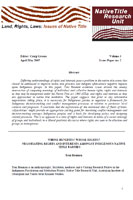Whose benefits? Whose rights? Negotiating rights and interests amongst Indigenous native title parties
Differing understandings of rights and interests pose a problem in the Native Title arena that should be addressed to improve native title practice and mitigate often-severe negative impacts upon Indigenous groups. In this paper, Toni Bauman examines issues around the uneasy intersection of competing meanings of individual and collective human rights, rights and interests as they may be interpreted under the Native Title Act 1993 (NTA) and rights and interests as they are approached in Native Title mediation.
The paper suggests that prior to any substantive negotiations taking place, it is necessary for Indigenous parties to negotiate a framework for Indigenous decision-making and conflict management processes in relation to particular local contexts and proposals. It concludes that the exploration of the relational idea of ‘fields of inter-subjectivities’ might provide an appropriate starting point for theorising conflict management and decision-making amongst Indigenous peoples and a basis for developing policy and designing related processes. This is as opposed to a view of rights and interests in terms of a social ontology of groups and individuals in a liberal positivist discourse where rights are seen to be absolute and groups as homogenous.
